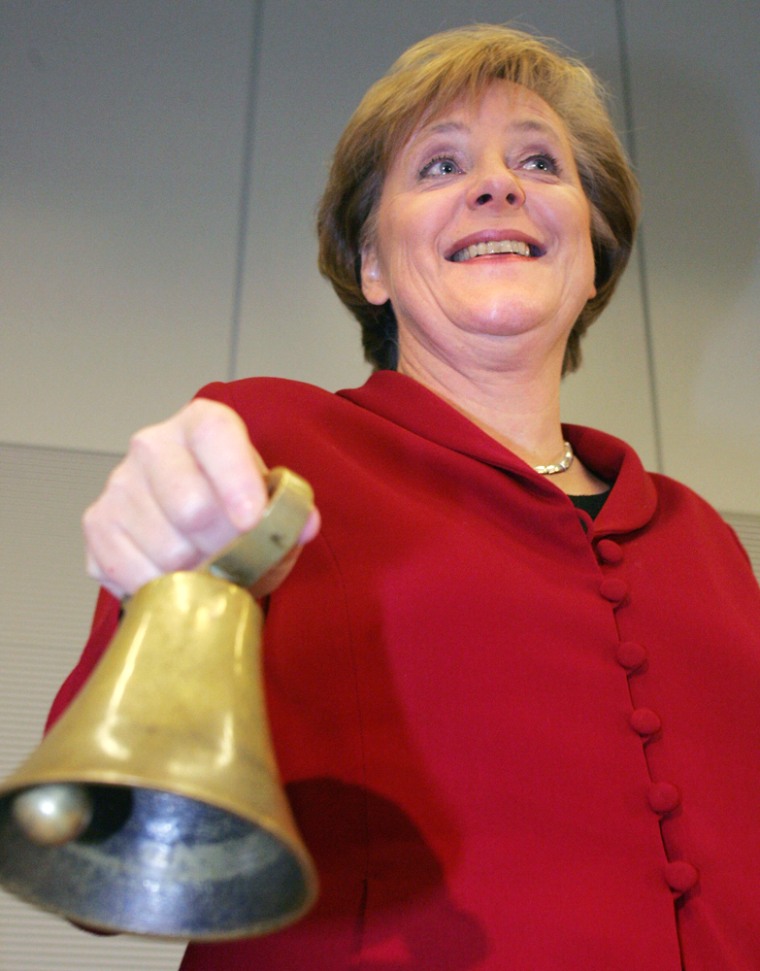In an historic moment for Germany, the parliament on Tuesday elected its first female chancellor — Angela Merkel, the daughter of a protestant minister from the former East Germany.
Merkel, 51, now heads a so-called "grand coalition" of Germany's two largest political parties — her own conservative Christian Democratic Union, and the center-left Social Democrats, the party of outgoing Chancellor Gerhard Schroeder.
The alliance of the former rivals finally emerged after weeks of political gridlock and negotiations on crucial economic issues, but the political roller-coaster ride has left voters and political experts skeptical that this government will be able to lead the country out of its economic malaise.
Political circus
As it became clear on election night that neither side had won a parliamentary majority, Schroeder harshly rejected the possibility of a Merkel chancellorship.
"Do you honestly believe that my party will enter talks with Mrs. Merkel, if she says that she wants to become chancellor?" Schroeder asked, startling the public, along with rival politicians.
And even when the party entered talks with Merkel's CDU, fierce internal clashes seemed to take over on both sides.
What was supposed to be a gradual process of transition in the SPD to a new generation of politicians, suddenly erupted into a power struggle and prompted party leader Franz Müntefering to step down.
Next, a powerful player on Merkel's conservative team, Edmund Stoiber, decided to stay in his beloved job as governor of Bavaria. Stoiber, once designated economic minister, was widely regarded as a political rival to Merkel — the man who would reign in the shadow of the chancellor.
Yet critics questioned Merkel’s leadership abilities and the German media repeatedly wondered if she was the right person to enact the needed reforms.
After nearly two months of back and forth negotiations, and drama on both sides, the two parties came to a hard-won agreement, with only a handful of dissenters in each party.
Made in East Germany
Now, the new "fall-of-the-wall generation" is at the helm of the two governing parties – Merkel on one side, and the recently elected Matthias Platzeck of the SPD on the other.
The two share similar backgrounds as they both hail from East Germany, are scientists known for their analytical thinking, and began their political careers later in life. In 1989, Merkel joined opposition movements in the former East Germany and entered mainstream politics after reunification. Platzeck only became a party member 10 years ago.
The two readily admit that their background and experience can bring a breath of fresh air to Germany's political landscape.
"We grew up under dictatorship, wanted democracy and were quickly given responsibility," said Platzeck, 51. "That sharpens the view for risks, but also for chances."
"The unifying experience which Mr. Platzeck and I share is that we both saw how change can generate something good," Merkel said on the German television station ZDF.
Bumpy road ahead
Undoubtedly, a lot of hard work lies ahead. The coalition’s chances of survival depend on the success of badly needed economic reform.
Germany’s economy, once the engine of Europe, is now one of the most sluggish in the European Union with growth expected below one percent this year and only slightly better in 2006.
The government will need to implement tough economic changes in a country reluctant to give up its beloved benefits.
This weekend, labor unions and representatives of the public sector were up in arms when the coalition announced that Christmas bonuses for public employees would be halved.
In addition, new hires now will have to stay on probation for up to two years — instead of six months — before they enjoy legal safeguards that make it difficult for employers to fire them.
To tackle Germany's high unemployment rate of 11 percent, the coalition has no choice other than to push ahead with drastic reforms, experts say. This includes a cutback on health benefits and a gradual increase of the retirement age from 65 to 67 between 2012 and 2035.
"The fact is that there still are jobs in Germany, but companies cannot afford them anymore," said political analyst Manfred Goertemaker, a professor at the University of Potsdam.
In order to fill budget holes, Merkel and her new government also announced a rise in sales tax by three percentage points to 19 percent in 2007. Industry leaders have complained that the government's warnings of higher taxes will stall Germany's recovery, but experts say that all sides have to make sacrifices.
“This is only the beginning of reforms, not even the end," Goertemaker noted.
Consequently, the signing ceremony for the coalition agreement lacked the fanfare of similar occasions in the past.
Merkel has already said she will cut retirement benefits and allowances for government ministers and politicians, including herself.
"No coalition is easy under the present circumstances," said Professor Thomas Risse of the institute for political sciences at the Free University in Berlin. "But, there are simply no other good alternatives."
